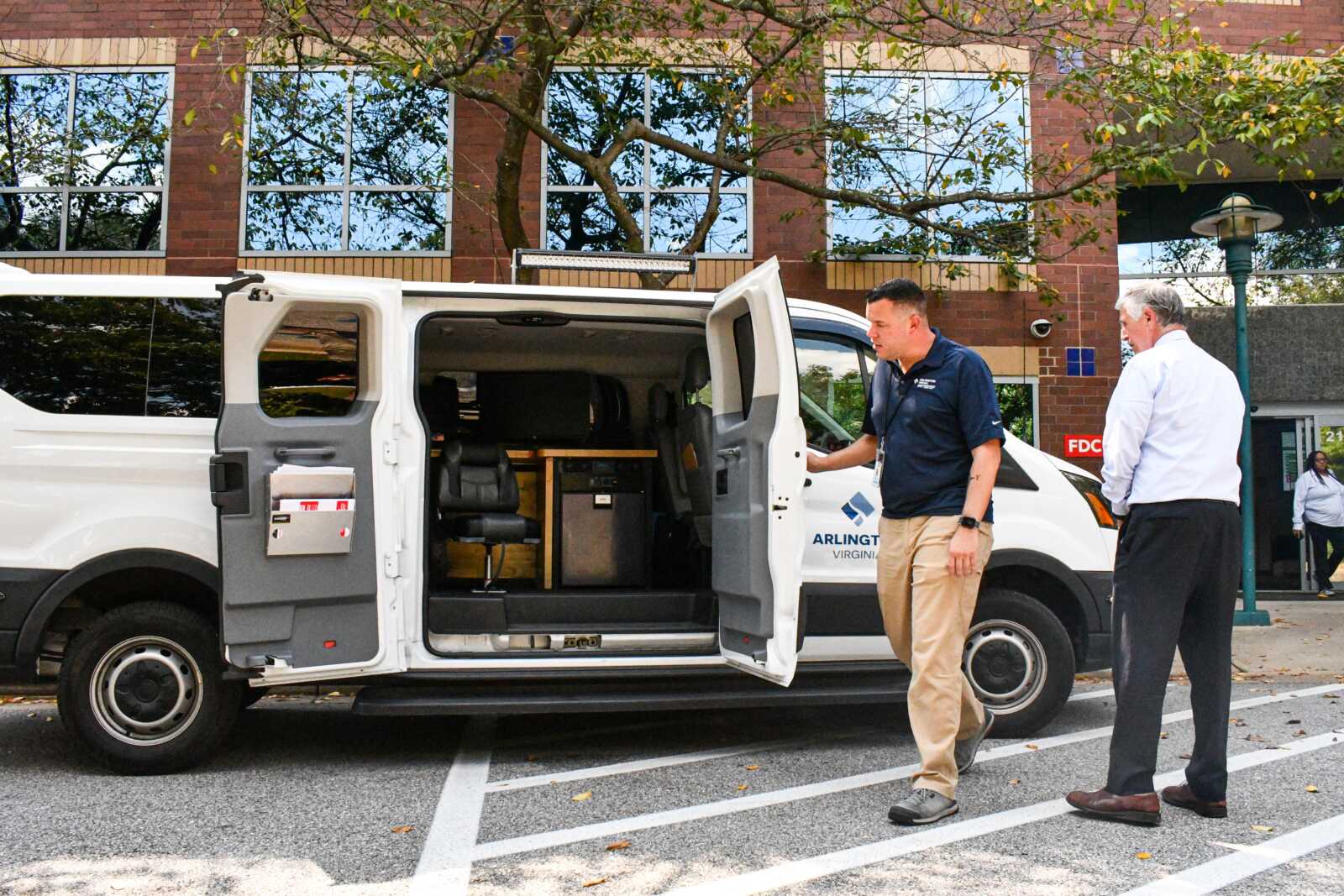“Are you available for a vehicle search, 66 and 495, to assist state?” screeches the police radio.
Cpl. Dave Torpy with the Arlington County Police Department receives a call from dispatch regarding a potential drug situation in Fairfax County. He confirms he can respond to the mutual aid call and heads out to his car to join his partner waiting inside. But his is no ordinary partner. Torpy gets to work with Ozzie, one of ACPD’s K-9 members.
The two head to the scene and find state police waiting for them. State police had pulled over the driver of a truck who was spotted wrecking one of his front wheels when he crashed into a jersey barrier. The driver allegedly kept going until he was pulled over, and police suspected he was under the influence of some sort of substance. Torpy and Ozzie were requested from Arlington because no other K-9 teams were available in Fairfax.
Torpy walks Ozzie to the vehicle and indicates places to sniff by leading his hand close to, but not touching, certain areas. He explains that officers are not allowed to search inside a vehicle without a warrant, but the law allows the investigation of the vehicle’s perimeter. Should a K-9 partner “hit” on a scent of drugs wafting from inside the vehicle to the outside, that’s considered probable cause and officers may perform a full search.
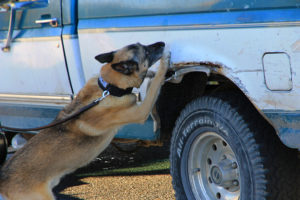 He points out areas where dogs often pick up drug scents emanating from inside, such as along door cracks or crevices in the vehicle body. But Ozzie doesn’t need any leading and pulls Torpy to a different portion of the vehicle. Ozzie stands up on the side of the truck bed, scratching and emitting low growls.
He points out areas where dogs often pick up drug scents emanating from inside, such as along door cracks or crevices in the vehicle body. But Ozzie doesn’t need any leading and pulls Torpy to a different portion of the vehicle. Ozzie stands up on the side of the truck bed, scratching and emitting low growls.
The multiple instances of scratching and barking are exactly what police look for; those actions are what the dogs are trained to do when they smell drugs. That is the permission police need to open this particular vehicle for probable cause and to continue their search.
Ozzie is allowed inside the vehicle and he repeatedly sniffs and scratches at the sun visors and along cracks around the door. Torpy explains those are two common places for suspects to stash drugs quickly when they’re getting pulled over by police.
When it’s clear that Ozzie smells something out of the ordinary, he’s led back to the ACPD cruiser to wait. It’s now time for humans to take over and to continue the search for illicit substances. Once humans enter the equation, dogs typically are not brought back in. Humans searching for items might spread the scent from a “hot” area to places where nothing was hidden. Bringing in a dog at that point could yield, for example, a dozen hits in a vehicle that previously only had one.
“He really likes this vehicle,” Torpy said. “He paid attention to the open window a lot and actually barked and scratched along the seams. If you weren’t initially looking for dope, you wouldn’t necessarily look at the seams. But his nose took us there so we can search further.”
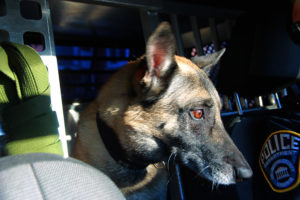 Ozzie, a Belgian Malinois, is one of the nine dogs in ACPD’s K-9 unit. Seven are “dual purpose” or patrol dogs that assist with building searches, evidence recovery, criminal apprehension and narcotics detection. Two are trained solely to detect explosives; one bomb detection dog belongs to a crime scene agent and the other belongs to a school resource officer.
Ozzie, a Belgian Malinois, is one of the nine dogs in ACPD’s K-9 unit. Seven are “dual purpose” or patrol dogs that assist with building searches, evidence recovery, criminal apprehension and narcotics detection. Two are trained solely to detect explosives; one bomb detection dog belongs to a crime scene agent and the other belongs to a school resource officer.
Most of the dogs are purchased from reputable breeders in Europe, but the two bomb dogs were rescues. One was adopted from a shelter in Loudoun County and the other was donated by a family that could no longer care for the dog.
Sgt. John McCarthy is also a dog handler and supervises the K-9 unit. McCarthy goes out on calls with his partner, Charly, just like all the other K-9 unit members, but he also oversees the unit’s operations. He handles scheduling, helps with handler and dog hiring, and purchases supplies like food and toys.
Prior to his appointment in 2007, the department did not have a supervisor for the unit. Arlington County Police Chief M. Douglas Scott was instrumental in adding the position and with expanding the K-9 unit to allow for nearly 24-7 police dog coverage.
“When I was doing a review of the units, I saw at the time we only had four dogs. They were not really a full unit they were just on squads,” said Scott. “I didn’t think it was an effective way to run the program.”
Scott joined the department in 2003 and approved the addition of two dual purpose dogs in 2004, two bomb detecting dogs in 2006, and McCarthy’s supervisory position including a dog in 2007.
“We’ve done it all gradually by converting existing positions,” said Scott. “I didn’t want to be going to the County Manager or County Board asking to add new positions. I made the case internally and started the expansion that way.”
The current price of a police dog runs around $7,000 plus the cost of continuous training. Those working in the unit, along with Chief Scott, believe it’s a wise investment.
“K-9 to me has always been something I would describe as a force multiplier. Their ability to get in and search a building, do a track, is so much better than using multiple officers or for officers to be doing a blind search. They’ve proven themselves time and time again,” Scott said. “It’s well worth the investment.”
In 2013, the ACPD K-9 unit responded to 495 calls in Arlington County and 27 mutual aid calls in neighboring jurisdictions. The dogs helped apprehend 22 criminals, found narcotics in 26 vehicles or residences and found narcotics 23 times during sweeps of packages at United States Postal Service facilities.
Back at the station, Torpy demonstrates how the dogs are motivated by “toy time.” He holds out one of Ozzie’s pull toys and the dog stares at the item, wide-eyed and unflinching. Time and again he wrestles with the toy, fetches it and begs for it to be thrown down the hall. It’s quite obvious why the department uses toy rewards instead of food incentives, with the exception of one K-9 that has no interest in the toys.
“What’s in it for them is really why they work. Why else would they work to find hidden drugs? Because at the end of finding hidden drugs they get a toy. If they didn’t get anything they may not work for us,” Torpy said. “Here’s the great thing about dogs, they don’t know what’s illegal. They don’t know what’s bad. They don’t know that heroin can kill you, they don’t know any of that stuff. All they know is ‘I’ve been taught to find the heroin smell and if I find the heroin smell, Dave gets really happy and sometimes he gives me treats.'”
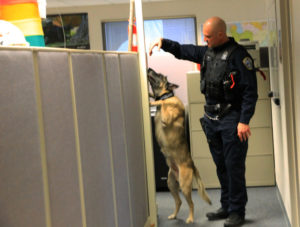 But just as quickly as Ozzie switched into play mode, he snaps right back into work mode. With one word from Torpy, Ozzie immediately drops his toy. With another, the dog begins tracking down the halls of the department wherever Torpy points.
But just as quickly as Ozzie switched into play mode, he snaps right back into work mode. With one word from Torpy, Ozzie immediately drops his toy. With another, the dog begins tracking down the halls of the department wherever Torpy points.
Dogs begin training typically around the age of 12 to 18 months and are allowed a couple of weeks to bond with their handler before the team undergoes 14 weeks of extensive training. The training regimen continues throughout the team’s career.
Torpy designs the training sessions that are held every Wednesday. Sometimes the whole team trains together and other times they break into their bomb or narcotics groups for more specialized training.
The K-9 unit holds much of its training during overnight hours because it allows the dogs to practice their skills in the field without the distraction of people on the streets. Compare, for example, a dog trying to track its target when the streets are relatively empty at midnight, versus a target rich environment during rush hour.
“The dog is trained to follow the freshest human scent, he can’t compartmentalize and say that’s bad guy smell versus good guy smell,” said McCarthy. “So at midnight there’s a better chance of him tracking his target.”
Dogs also receive training during the day to keep their skills in crowds sharp and to keep them up to speed in a variety of situations.
Although the dogs receive most of the public attention, they’re not the only ones being put through the wringer. The human handlers have just as much training and are held to high standards by the department. McCarthy said he uses a discerning eye when interviewing officers for a handler spot, and requires a fairly seasoned officer who has worked at least a couple of different jobs within the department. He particularly gravitates toward candidates who exhibit “maturity and stability.”
“I want someone who knows their way around the county and the department, because at some point in this job there will be tough times,” McCarthy said. “Whether it’s the dog’s health, or the dog not responding to the handler, or some other problem, it’s very physically and mentally demanding. We look for people who are stable and mature. It’s a great group of people we have.”
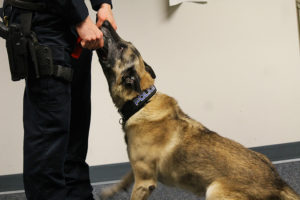 Just as with any physically demanding job, the dogs do sometimes become injured while on duty or during training. No dogs with ACPD have had any major, life-threatening injuries in the line of duty. They do, however, sometimes sustain cuts, broken toes or damaged teeth. That’s when it’s time for a trip to one of the vets the department has a contract with.
Just as with any physically demanding job, the dogs do sometimes become injured while on duty or during training. No dogs with ACPD have had any major, life-threatening injuries in the line of duty. They do, however, sometimes sustain cuts, broken toes or damaged teeth. That’s when it’s time for a trip to one of the vets the department has a contract with.
“They’re kind of like athletes, they get hurt. We treat them with medicine or rest,” said McCarthy. “There’s a lot of time invested in the training of the dogs. Their health and well-being is a huge part of our lives.”
At times, injuries may force the dogs to take off for a few weeks. They still maintain all their training knowledge despite extended days away from work.
“It’s amazing when you’re new you’re very fearful your dog will unlearn everything he’s learned. After the countless repetitions you do in that 14 weeks and throughout your career, the dog is a finished product and they know the cues as well as you do,” said McCarthy. “If I’m in my car and I go to put his harness on, he knows pretty much what we’re going to do. I almost don’t have to give him a command.”
The breeds that work as police dogs — at ACPD that’s mostly the Belgian Malinois or German Shepherds — are chosen because they have a very high drive and are highly obedient.
“We’re really cueing off their innate dispositions to hunt. That’s in them genetically,” McCarthy said. “We just modified it, motivated them and tweaked it to what we want them to do. It’s just taking that natural drive they have and we’re tuning it.”
Despite the instinct to hunt, the dogs are not vicious. They’re gentle and loyal and only attack if commanded to by a handler.
“I think they make us a much more effective agency. I think the vision some people have of the snarling German Shepherd, the very intimidating, I have not seen our dogs used in that way for my entire time here, for that intimidation factor,” said Scott. “I think that goes to the training we provide to our officers and the documentation that goes along with that level of force, to make sure it is done in a proper and procedural way.”
The dogs are also known for being incredibly protective of their handlers and becoming quickly attached.
“One of the biggest challenges in K-9 is that it’s 24-7 for the handlers and their family,” Scott said. “This tool goes home with them and needs proper care and attention. That’s quite a commitment on the officer’s part to accept that responsibility.”
McCarthy agreed with Scott’s assessment of the challenge, adding that the dogs living with their handlers is probably the most surprising aspect to the public.
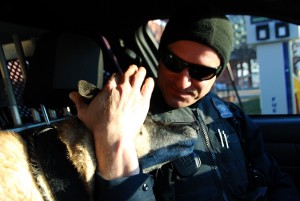 “People are very surprised they [the dogs] live with us as a pet when they’re off duty. But I think that’s how most jurisdictions do that. I think in the public’s mind there’s some sort of special kennel system where we leave them, but they live with us,” said McCarthy. “That’s a hard part of it, your work is always with you. It’s even looking at you in the middle of the night when it has to go to the bathroom.”
“People are very surprised they [the dogs] live with us as a pet when they’re off duty. But I think that’s how most jurisdictions do that. I think in the public’s mind there’s some sort of special kennel system where we leave them, but they live with us,” said McCarthy. “That’s a hard part of it, your work is always with you. It’s even looking at you in the middle of the night when it has to go to the bathroom.”
Because of the intense bond shared between the members of the K-9 teams, handlers take it rather hard on the rare occasions when one of the dogs dies during its time on the force. Such was the case last year when Dutch came down with a rare, fatal illness. Fortunately, most of the dogs meet a more pleasant retirement once they’re deemed unfit for work. Failing senses — such as eyesight or hearing — typically proves to be the harbinger of retirement. ACPD allows the handlers to adopt their retired dogs for free if they so choose.
“It’s a very rewarding job. It’s been a great time for me,” said McCarthy. “It’s my last job in this department. My dog is eight years old, he and I are both getting older. We’ll retire together.”
Recent Stories
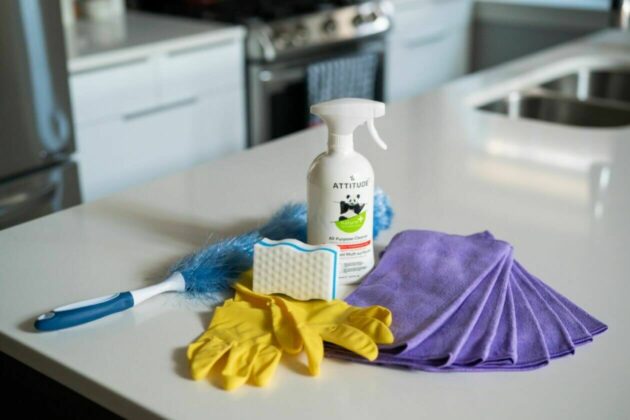
Unlike our competitors, Well-Paid Maids doesn’t clean your home with harsh chemicals. Instead, we handpick cleaning products rated “safest” by the Environmental Working Group, the leading rating organization regarding product safety.
The reason is threefold.
First, using safe cleaning products ensures toxic chemicals won’t leak into waterways or harm wildlife if disposed of improperly.
Second, it’s better for you and your family. Fragrant chemicals in surface cleaners can expose you to a similar amount of pollutant particles as a busy city road, New Scientist reported.
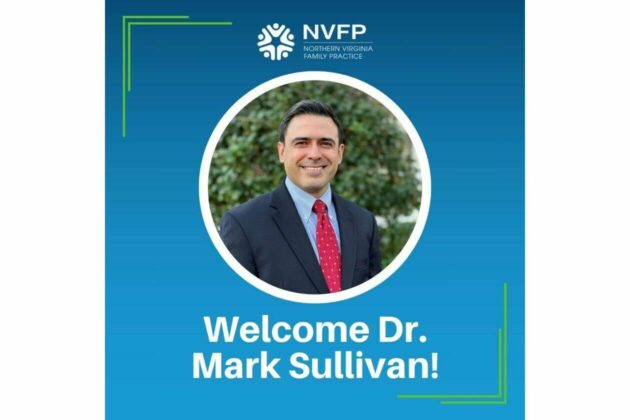
Northern Virginia Family Practice (NVFP), known for its comprehensive concierge healthcare, is thrilled to introduce Mark Sullivan, MD as the newest member of its family medicine team.
Dr. Sullivan brings a wealth of experience in family medicine, underpinned by a passion for delivering personalized, patient-centered care. He has a distinguished background in managing various medical conditions, emphasizing preventive care, health education and chronic disease management. Dr. Sullivan is adept at employing the latest medical research and technologies to enhance patient outcomes.
Beyond his medical expertise, Dr. Sullivan is committed to the well-being of his community, demonstrating this through his active engagement in local health initiatives and educational programs. His approach to medicine is holistic, focusing on integrating physical, mental and emotional health and patient education to achieve optimal patient wellness.
Dr. Sullivan is now accepting new patients at their newly established Arlington office at 2445 Army Navy Drive, Arlington, VA, 22206. The office, known for its patient-friendly amenities and state-of-the-art medical facilities, continues to provide the exceptional, personalized care NVFP is known for in its newly upgraded Arlington location.
ACFCU’s Free Homebuying 101 Webinar: Steps to Getting Pre-Approved
Are you ready to jump into homeownership, or have you started considering it but don’t know where to start?
Financial preparation is key when thinking about purchasing your first home and the first step to getting pre-approved. Join ACFCU for
Sweeney Todd
A victim of a gross injustice that robbed him of his wife and child, Sweeney Todd sets about exacting a terrible revenge on society.


